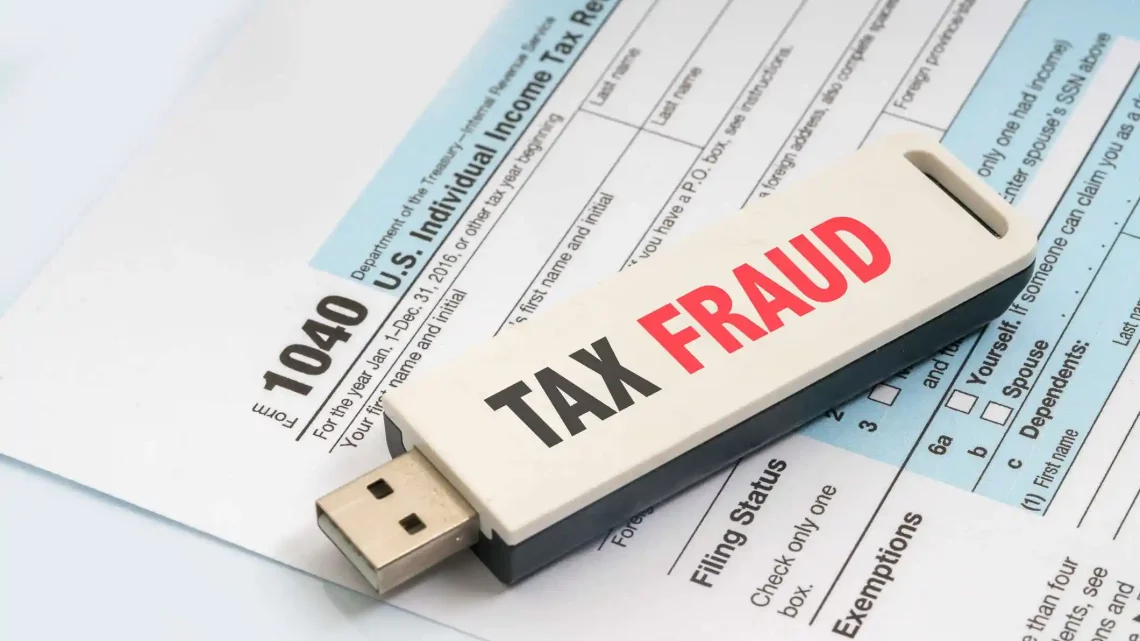
Tax Fraud Explained: Meaning, Types, and Tips
July 12, 2023Tax fraud refers to the illegal act of falsely claiming tax deductions or credits, failing to report all income, or not paying taxes owed. This can be done by individuals, businesses, or even tax preparers. Tax fraud can lead to significant fines and even criminal charges.
Understanding the types of tax fraud and the red flags that may indicate fraudulent activity can help prevent you from becoming a victim or inadvertently committing tax fraud yourself. It is important to understand the laws and regulations surrounding taxes to ensure compliance and avoid any legal issues.
What Qualifies As Tax Fraud?
Any act to wilfully avoid paying all or part of your taxes qualifies as tax fraud, and there are lots of them. Some examples of them are:
- Claiming false deductions or credits on a tax return, such as claiming charitable donations that were not made or claiming dependent children who do not qualify.
- Failing to report all income earned, such as not reporting cash payments or income from a side business.
- Not paying taxes owed, such as failing to file a tax return or not paying taxes owed on time.
- Using a false Social Security number or Employer Identification Number (EIN) on a tax return.
- Claiming false business expenses, such as claiming personal expenses as business expenses.
- Using a tax preparer who engages in fraudulent activity, such as claiming false deductions or credits.
It is important to note that making an honest mistake on your tax return does not qualify as tax fraud. However, if the IRS determines that the mistake was made with the intent to evade taxes, it could be considered fraud.
Difference Between Tax Fraud and Tax Evasion
Tax fraud and tax evasion are related but distinct concepts. Tax fraud refers to the illegal act of falsely reporting or underreporting income, claiming false deductions or credits, or failing to pay taxes that are owed. This could result in severe penalties such as fines, imprisonment, and penalties.
Tax evasion, on the other hand, refers to the legal means of paying fewer taxes than owed by exploiting loopholes or taking advantage of deductions. This is not a criminal offense but is still considered a violation of tax laws and can result in fines and penalties.
For example, if an individual fails to report all of their income, it is considered tax fraud. If an individual takes advantage of legal tax deductions and credits to reduce their tax liability, it is considered tax evasion.
It’s important to understand the tax laws and regulations and ensure that you comply with them to avoid any legal issues. If you are unsure about how to report your taxes or have any questions, it’s best to consult a tax professional or the appropriate tax authority.
Types of Tax Fraud
Some of the most common types of tax fraud are:
- Income tax fraud: This occurs when an individual or business falsely reports their income or fails to report all of their income in order to pay less in taxes than they owe.
- Claiming false deductions or credits: This occurs when an individual or business claims deductions or credits to which they are not entitled, such as claiming deductions for charitable donations that were not made or claiming credit for a dependent who does not qualify.
- Falsifying records or using false identification: This occurs when an individual or business falsifies records or uses false identification to claim a tax refund or other benefits.
- Payroll tax fraud: This occurs when an employer fails to pay payroll taxes that have been withheld from employees’ paychecks.
- Sales tax fraud: This occurs when a business fails to collect or report sales tax that is owed to the government.
- Money laundering: This occurs when an individual or business uses illegal funds to purchase legitimate assets or businesses or to fund other illegal activities.
Penalties for Criminal Tax Fraud
Penalties for criminal tax fraud can be severe and can include fines, imprisonment, and other penalties. The specific penalties will depend on the nature and severity of the fraud, as well as the jurisdiction in which the fraud was committed.
For example, if an individual is convicted of tax fraud, they may face fines of up to $100,000 for each count, and/or imprisonment for up to five years for each count. Businesses convicted of tax fraud can face fines of up to $500,000 for each count, and/or imprisonment for up to five years for each count.
Additionally, a person convicted of tax fraud may also be required to pay restitution to the government, which can include the amount of taxes that were not paid as well as any interest and penalties that have accumulated.
It’s important to note that in addition to these penalties, a person convicted of tax fraud may also face other consequences such as being barred from certain professions, being denied government benefits, and having their assets seized.
Tips to Avoid Tax Fraud
Here are a few tips to help you avoid tax fraud:
- Be cautious about providing personal information: Only give your personal information to trusted sources, such as your tax professional or the IRS. Be wary of unsolicited phone calls, emails, or mail that ask for personal information.
- Be sure to keep accurate records: Keep accurate records of your income and expenses throughout the year. This will make it easier to prepare your taxes and ensure that you are reporting all of your income.
- Be careful when choosing a tax preparer: Choose a tax preparer who has a good reputation and is qualified to prepare taxes. Avoid preparers who make unrealistic promises or charge a percentage of the refund.
- Review your tax returns before you file them: Review your tax returns carefully before you file them. Make sure that all the information is accurate and that you are not claiming any false deductions or credits.
- Be aware of tax scams: Be aware of common tax scams, such as phishing emails or phone calls that claim to be from the IRS. Remember that the IRS will never contact you by phone or email to ask for personal information.
- Report suspicious activity: If you suspect that you are a victim of tax fraud or if you suspect that someone else is committing tax fraud, report it to the appropriate authorities.
Conclusion
In conclusion, understanding tax fraud is important for individuals and businesses to ensure compliance with tax laws and regulations, and to avoid any legal issues.
Penalties for criminal tax fraud can be severe, including fines, imprisonment, and other penalties. To avoid tax fraud, it is important to be cautious about providing personal information, keep accurate records, choose a reputable tax preparer, review tax returns before filing them, be aware of tax scams, and report suspicious activity.


